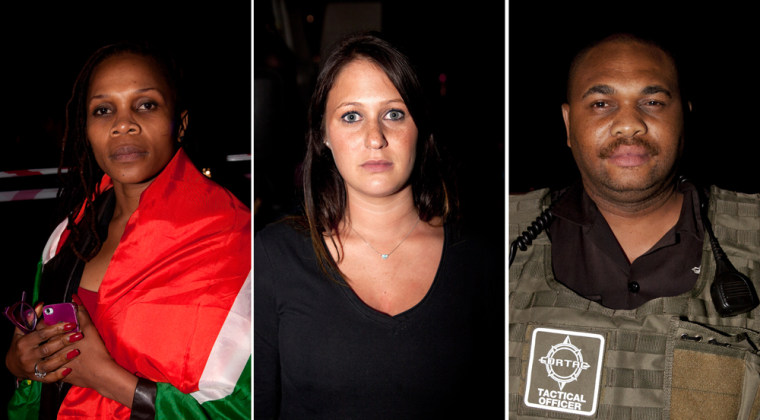JOHANNESBURG, South Africa -- Hundreds of people of all ages, colors and creeds gathered outside Nelson Mandela's home in Houghton, Johannesburg, on Friday to pay their respects to South Africa's iconic leader, who died Thursday at the age of 95. The gathering was emblematic of the spontaneous outpouring of tributes popping up across the country of 48 million.
Many sang and danced in joyous celebration of his life, others reflected somberly with heads down, trying to comprehend the news that the symbol of South African unity is gone.
Thousands more are expected to make the pilgrimage over the next week, with memorials springing up across the nation -- from the township of Soweto outside Johannesburg to Mandela's hometown of Qunu, where his state burial will be held.
"He means the world to us," Phokeng Mohatlane told NBC News outside Mandela's home. "Through his humility he has inscribed self-respect and greatness in each one of us. He has improved our destiny. People will go back to what he stood for and not take things for granted."

"He was the father of this nation," Tshepo Mokhele added. "We all feel really sad about this death. We need to unite and it's time the African National Congress unites now, too."
Kuki Bundwini, 56, said she came to show her love and respect for “Tata,” or “father,” as Mandela is known.
“So may things have happened since Tata has been out of jail,” she said. “We have been so blessed.”
“There is absolutely no one like him,” said Zukie Kepe, 41, an information technology worker. “He must just rest in peace. We release him in peace."
Dali Tambo, son of anti-apartheid struggle stalwart Oliver Tambo, left Mandela’s house in the early hours of the morning after paying his respects along with his wife and children.
"I suppose even though it was expected, there's a degree of shock,” he said. "We're all very sad. It's the passing of an era."
“I feel like a rare species has disappeared from this Earth and we'll never get it again."
Tambo said that in contrast to the celebrations on the street, inside the house the atmosphere was “quiet and sober,” with family members and ANC leaders joining together in a prayer.
Flags flew at half mast across the country, and trade was halted for five minutes on the Johannesburg stock exchange.
Others were worried about what the future held for South Africa now that Mandela is gone.
"Mandela is the eternal symbol of courage, hope, integrity, respect and forgiveness," said Calli Leeb. "South Africa is going to go downhill from here."
Claudia Davimes added that South Africa was now "rudderless" and that the current government did not have the strength that Mandela had shown.
"I'm worried about my country now," said Eric Williams.
Many attended church services, including another veteran anti-apartheid campaigner, former Anglican Archbishop of Cape Town Desmond Tutu. He said that like all South Africans he was "devastated" by Mandela's death.
"Let us give him the gift of a South Africa united, one," Tutu said, holding a mass in Cape Town's St George's Cathedral.
Shortly after the news of Mandela's death, Tutu had tried to calm fears that the absence of the man who steered South Africa to democracy might revive some of the ghosts of apartheid.
"To suggest that South Africa might go up in flames - as some have predicted - is to discredit South Africans and Madiba's legacy," Tutu said in a statement on Thursday.
"The sun will rise tomorrow, and the next day and the next ... It may not appear as bright as yesterday, but life will carry on," Tutu said.
Many of the mourners outside Mandela's home wore traditional garb of the Zulu, Xhosa and South Africa's other ethnic groups. One carried a sign saying: "He will rule the universe with God."
Jewish and Muslim leaders were also present. People sang tribal songs, the national anthem, God Bless Africa — the anthem of the anti-apartheid struggle — and Christian hymns.
For 16-year-old Michael Lowry, who has no memory of the apartheid system that ended in 1994, Mandela's legacy means he can have non-white friends. He attended two schools where Mandela's great grandchildren were also students.
"I hear stories that my parents tell me and I'm just shocked that such a country could exist. I couldn't imagine just going to school with just white friends," Lowry said.
Preparing for larger crowds in the coming days, portable toilets were delivered and an entrepreneur set up a stall selling flags and paraphernalia of Mandela's political party, the African National Congress (ANC).
The mood was somber in Qunu, the rural Eastern Cape village where Mandela spent his boyhood years, and where he lived after retirement until ill health forced him back to Johannesburg.
The local Daily Dispatch newspaper reported that a Xhosa praise singer shouted outside the gates of Mandela’s home in Qunu, calling on the villagers to wake up as “a great tree has fallen.”
Hundreds more gathered in Soweto, which was the epicenter of the anti-apartheid movement and home to Nelson and Winnie Mandela before he was jailed in 1962.
Singing songs from the anti-apartheid struggle, many draped themselves in South African flags and the green, yellow and black colors of Mandela's ANC party.
"All that I can do is thank God that I had a grandfather who loved and guided all of us in the family," Mandla Mandela said in a statement. "The best lesson that he taught all of us was the need for us to be prepared to be of service to our people. We in the family recognize that Madiba belongs not only to us but to the entire world."
NBC News' Michelle Kosinski, GlobalPost's Erin Conway-Smith and Reuters contributed to this report.
Related: